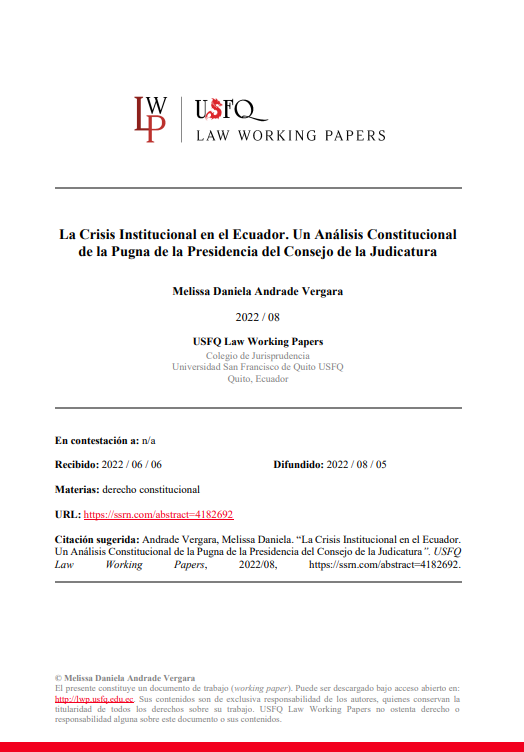The Institutional Crisis in Ecuador
A Constitutional Analysis of the Dispute Over the Presidency of the Council of the Judiciary
DOI:
https://doi.org/10.18272/usfqlwp.105Keywords:
referendum, sovereignty, derivative democracy, interpretative opinions, ordinary regime, extraordinary regime, Council of the Judiciary, Protection ActionAbstract
This paper will analyze the concepts of derivative democracy (2018 popular consultation) that produced a first constitutional shield and the extraordinary powers of the Council for Citizen Participation and Transitory Social Control (hereinafter CPCCS[1]T) for the designation of authorities; the President of the CPCCS-T activated the Interpretation Action which caused a second constitutional shield by the Constitutional Court with its interpretative ruling No. 2-19-IC/19. In addition, it will examine the recent parameters established in judgment No. 2670-18-EP/21 and in judgment No. 2403-19- EP/22 issued by the Constitutional Court, which determined the separation of two legal regimes: on the one hand, the Ordinary and, on the other, the Extraordinary; and, finally, 2 if the actions of the Council for Citizen Participation and Temporary Social Control can be reviewed. This controversy arose from the resignation of the former president, Dr. María del Carmen Maldonado, the isolated and partial interpretation by the former president of the National Court, an illegitimate extraordinary session of the Council of the Judiciary that omitted the Interpretative Opinion and the protection action filed by the alternate member of the Presidency of the Judicial Council, Dr. Álvaro Román Márquez. The final part will analyze whether the Protection Action previously mentioned, deserves to be subject to an examination of merit by the Constitutional Court.

Posted
License
Copyright (c) 2022 Melissa Daniela Andrade Vergara

This work is licensed under a Creative Commons Attribution-NonCommercial 4.0 International License.
